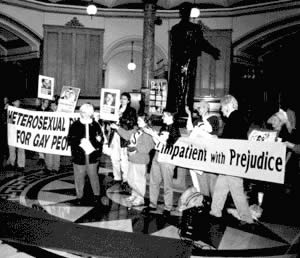|
|
|
|
85%
Coalition Fights for 100% Equality Under Law
by Liam O'Donoghue
 "You're
fired because you're gay." "You're
fired because you're gay."
This was the message Red Lobster sent Dale Hall, an associate
manager at the Lincolnwood restaurant, in 1996. In Illinois,
there is currently no state law prohibiting an employer
from handing a worker a pink slip bearing the simple explanation,
"Reason for dismissal: Employee is homosexual."
The Illinois Human Rights Act protects people, at least
in theory, from discrimination based on race, religion,
ethnicity, gender, age, disability, marital status, and
military status. But it does not include sexual orientation.
Cook County's Human Rights Act does contain a provision
which includes sexual orientation, and it is the only
reason Dale Hall got his job back. Following the decision
of the Cook County Commission on Human Rights to award
Hall damages, back pay, and interest, Red Lobster's owners,
the Darden Restaurant chain, tried to appeal by having
the civil rights law declared unconstitutional. However,
bowing to the threat of a boycott and a spate of negative
publicity generated by gay rights advocacy groups, the
company dropped its appeal.
In 1991, the Cracker Barrel restaurant chain issued a
memo recommending the termination of employees "whose
sexual preferences fail to demonstrate normal heterosexual
values which have been the foundation of families in our
societies." Julie Davis, a Cracker Barrel representative,
attributed the memo to "an erroneous statement issued
by a vice president who was replaced." But the eleven
employees who were fired as a result of this "erroneous
statement" were never rehired or offered compensation.
Only nine states and scattered counties in the United
States offer legal protection against such discrimination.
This means that if a lesbian, gay, bisexual, or transgendered
individual (LGBT) wants to minimize his or her chances
of being denied housing or employment due to sexual orientation,
(s)he must live in an area with a strong law prohibiting
sexual orientation discrimination, or at least with a
strong vocal opposition to such practices. Champaign County
arguably has the latter, but not the former.
A primary voice for change in Champaign County and east
central Illinois is the 85% Coalition. Explains the groupís
co-founder Mary Lee Sargent, "The name comes from
a 1998 University of Illinois-Springfield poll that asked,
'Do you think there should or should not be equal rights
for LGBT people in terms of job opportunities and housing?'
More than 85 percent responded 'should be.'"
In February of 2001, members of the 85% Coalition were
arrested at the Capitol building in Springfield while
trying to convince lawmakers to add the sexual orientation
provision to the Illinois Human Rights Act. (The Act,
besides protecting against discrimination in employment
and housing, also covers public accommodations and credit.)
Their strategy was to bring pressure to bear by raising
public awareness. "We can't influence the legislators,"
group member Meg Miner said, "but we can influence
the people who vote for them by getting our cause media
coverage."
There were certainly cameras clicking during the incident
that February, when six of the 85%ers were thrown into
a paddy wagon at the Capitol. Their crime? Chanting "No,
no, we won't go / until we have equality! / We're your
daughters, we're your sons! / Pass House Bill 101!"
"We were arrested for the equivalent of disturbing
the peace, which we were prepared to accept, and trespassing,
even though we were in a public forum with 75 other members
of the public," Miner said. "It went to trial
and we were acquitted." The demonstration and subsequent
arrest did, however, receive the desired media coverage.
Demonstrations by the group have continued at a steady
rate, with several occurring this spring in response to
the impending June 30 deadline for passing new legislation
in this year's legislative session. 85% Coalition co-founder
Kimberlie Kranich explained the need for continued direct
action this way: "There is historical proof that
social change doesn't happen by asking." In her view,
the fiery feminists of the early twentieth century women's
suffrage movement, and the defiant blacks of the more
recent civil rights movement, demonstrated that turning
a conservative tide is not an easy task.
House Bill 101 (chief sponsor Larry McKeon, D-Chicago)
faced consistently stiff opposition in its previous incarnation
as House Bill 474. Representative Rick Winkel (R-Champaign)
and both former and current Republican representatives
from Urbana, Tim Johnson and Tom Berns respectively, have
voted against adding sexual orientation to the Illinois
Human Rights Act. Repeated attempts to contact Winkel
(three phone calls during business hours and three e-mails)
and Berns (four phone calls during business hours) regarding
their current positions on House Bill 101 yielded no response.
But in the past both have stood by the claim that they
are "against any bill that would give a group special
or extraordinary rights."
On the other hand, a letter from the Office of the Governor,
dated March 19, 1999 and signed by Governor George Ryan,
Lieutenant Governor Corinne Wood, Attorney General Jim
Ryan, Secretary of State Jesse White, Treasurer Judy Baar
Topinka, and Comptroller Daniel W. Hynes, addressed to
"Colleagues in State Government" on the subject
of House Bill 474, stated, "No group of Illinoisans
should receive special privileges, and no groups should
suffer from special legal disabilities. This law provides
no special rights, affirmative action, or quotas. It simply
protects us all from discrimination."
The argument that this legislation would give homosexuals
special rights is one commonly marshaled by right-wing
religious groups, who have traditionally been the most
vocal segment in opposition to laws which could be construed
as condoning homosexuality. When contacted about the group's
political stance on this issue, Executive Director of
the Illinois Family Institute Dennis LaComb said, "We
believe homosexuals are portrayed in a positive, though
unrealistic, light in a media that often has a pro-homosexual
agenda."
The IFI, whose Director of Public Policy Virginia Nurmi
is in the Governor's Children and Family Leadership sub-cabinet,
released several handouts in response to requests for
further elaboration on its position. Homosexuality, the
IFI states, "is just one form in which the brokenness
of humanity reveals itself, along with greed, hatred,
fear, dishonesty and intemperance." According to
the release, "there are substantial reasons for opposing
the current attempts to grant gays, lesbians, and bisexuals
the 'special' rights they seek."
One of the reasons given in the group's literature is
that "they are not discriminated against in any of
the key areas judged essential by the courts, namely economic
status." This despite the fact that a 1995 study
by the University of Maryland found that "lesbians
earn up to 14 percent less than their heterosexual female
peers with similar jobs, education, age, and residence."
Controlling for the same factors, the study found that
gay and bisexual male workers earned from 11 percent to
27 percent less.
Seated in the corner of a bustling vegetarian cafÈ
on a drizzly Sunday morning, former history professor
and sturdy matriarch of the 85% Coalition Mary Lee Sargent
voiced her strong opinions on economic and employment
discrimination affecting LGBT individuals, in addition
to arguably lower wages. Using herself as an example,
she said, "Illinois does not recognize a legal marriage
union between homosexuals. If I die, my life partner will
get a $1000 survivor benefit from Parkland College, because
she is designated as my beneficiary. But if we were married,
she would get half my pension for the rest of her life.
If she lived ten years, that would be a quarter of a million
dollars. If House Bill 101 passed, you could at least
make a legal case in a civil suit."
Irrespective of statistics in favor of either position,
many LGBT people, not unlike their religious counterparts,
view the fight over House Bill 101 as a question of values.
"At least on one level," Miner said, "the
government would be admitting that not all homosexuals
are scumbags." Kranich added, "The religious
right knows that if the law passes, it signals a change
in values, and that shift would be away from their values,
which view homosexuality as a condemnable sin."
The current General Assembly has a little over two months
left to vote on the bill, but members of the 85% Coalition
are realistic about their struggle to get prohibitions
against sexual orientation discrimination enacted into
law. Questioned about the bill's chances, Meg Miner replied,
"I think theyíll use September 11 and the
budget to say, 'We have a lot more important things to
deal with.'"
Despite the seemingly bleak immediate outlook, the dissidents
are unwavering in their commitment. Regarding the uphill
battle ahead, Kim Kranich vowed with her head held high,
"It may take years to build the momentum, but my
hope is based on a long-term vision." |
|
|
|






